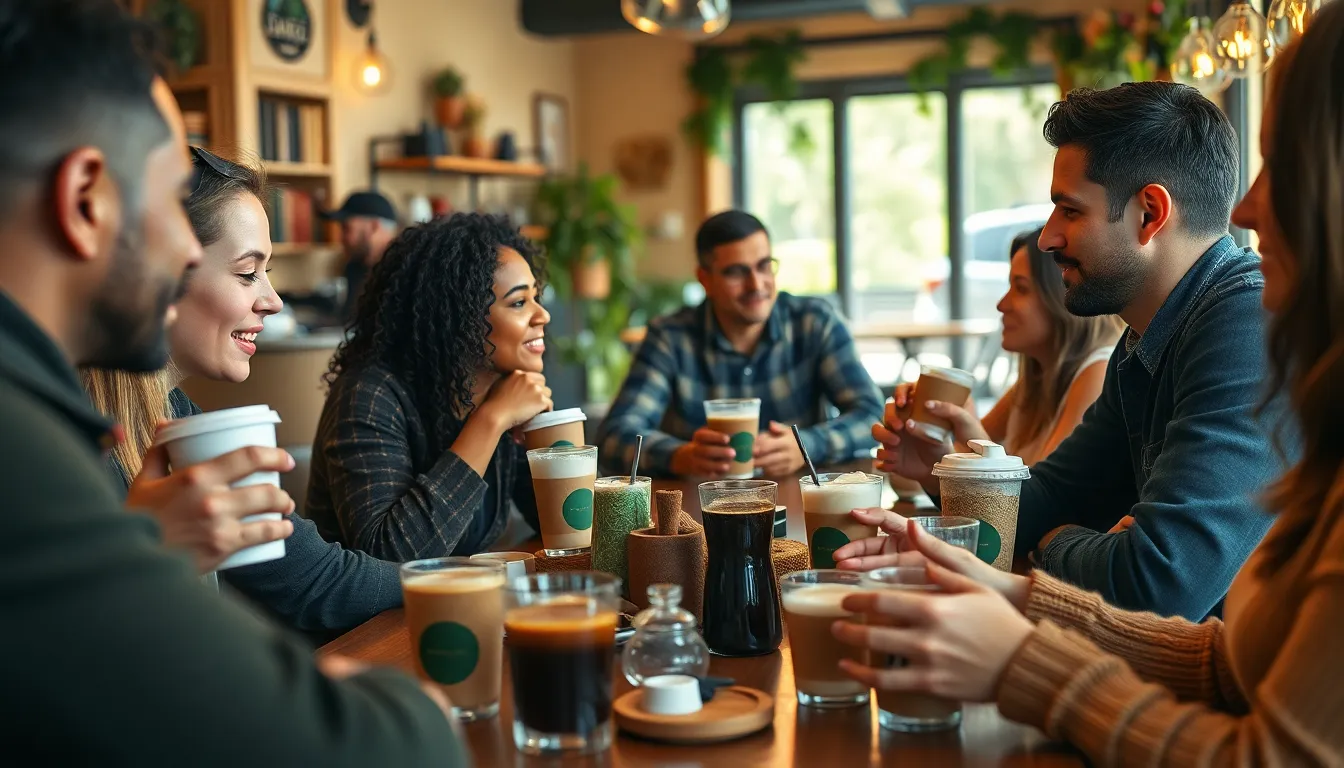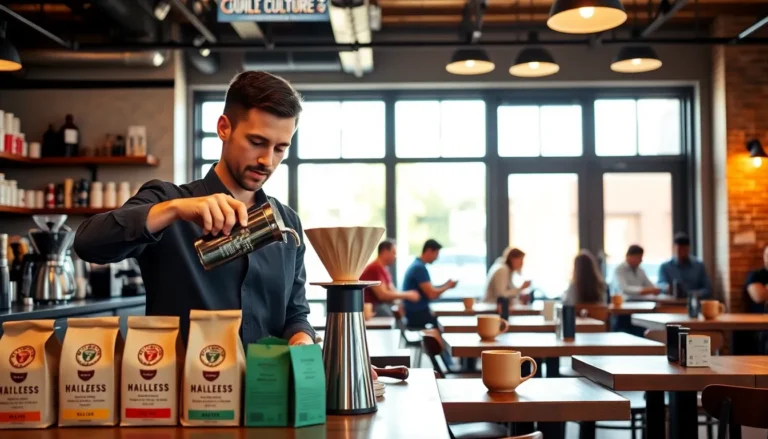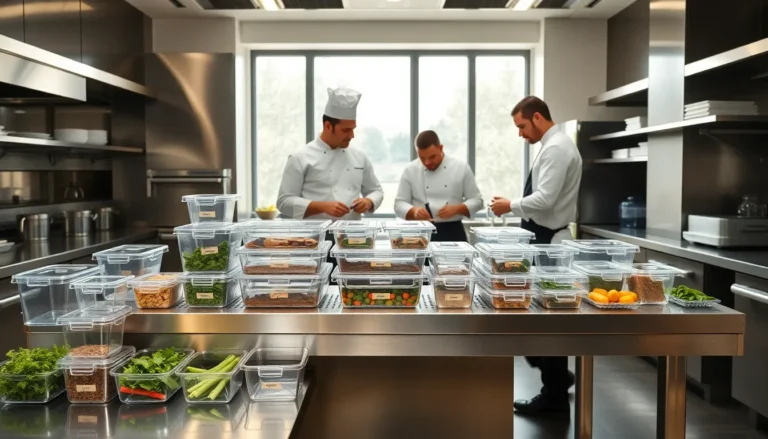As coffee culture continues to thrive, understanding consumer trends becomes essential for businesses and enthusiasts alike. More than just a morning ritual, coffee has transformed into a lifestyle choice that reflects personal values and preferences. From sustainable sourcing to innovative brewing methods, today’s coffee drinkers are more discerning than ever.
Recent studies reveal shifts in preferences, with an increasing number of consumers gravitating towards specialty coffees and unique flavor profiles. Health-conscious choices are also on the rise, as people seek beverages that align with their wellness goals. By exploring these trends, stakeholders can better cater to the evolving demands of coffee lovers and stay ahead in a competitive market.
Table of Contents
ToggleOverview of Coffee Consumer Trends
Coffee consumer trends reveal significant changes in preferences and purchasing behavior. Specialty coffee enjoys increased popularity, with 63% of consumers regularly choosing it over standard options. Unique flavors and artisanal brewing methods attract a diverse customer base, promoting exploration in coffee experiences.
Health-conscious choices drive consumption patterns as well. Many consumers seek organic, fair-trade, or sustainably sourced coffees, aligning their purchases with personal values. A notable 55% of coffee drinkers favor brands that emphasize ethical production methods.
Innovative products cater to evolving tastes. Cold brew and nitro coffee products capture attention, appealing to younger demographics who prioritize convenience and novelty. Additionally, ready-to-drink coffee options rise in popularity, with sales increasing by 20% over the last year.
Lastly, technology influences consumer behavior. Mobile ordering and subscription services streamline the coffee-buying process, enhancing customer convenience. Approximately 45% of coffee drinkers are now willing to use apps to facilitate their purchases, exemplifying the integration of technology into daily habits.
Factors Influencing Coffee Consumption

Coffee consumption trends evolve based on several key factors. Understanding these influences is crucial for tapping into the market’s potential.
Health Consciousness
Health consciousness drives many coffee consumers to seek options that align with their wellness goals. About 55% of consumers prefer organic or low-calorie alternatives, signaling a demand for healthier beverages. Popular choices include specialty coffees fortified with antioxidants or functional ingredients like adaptogens and collagen. Many consumers favor brands that clearly label health benefits, influencing their purchasing decisions.
Sustainability Concerns
Sustainability concerns significantly impact consumer choices. Approximately 55% of consumers support brands that emphasize ethical sourcing practices. Fair-trade, organic certifications, and local sourcing appeal to eco-conscious buyers. Many consumers also inquire about companies’ environmental impact, with a preference for those utilizing sustainable packaging. The trend toward sustainable consumption influences not just purchasing behavior but also brand loyalty, encouraging businesses to adopt greener practices.
Popular Coffee Types Among Consumers
Coffee consumption preferences among consumers reflect evolving tastes and lifestyles. Key trends show notable shifts toward specialty and instant coffee types, each catering to distinct consumer needs.
Specialty Coffee
Specialty coffee remains a favorite, representing approximately 63% of consumer choices. This coffee type prioritizes unique flavors and high-quality beans sourced from specific regions. Popular varieties include single-origin, gourmet blends, and artisan roasts. Seasonally inspired flavors also attract adventurous consumers, with options like pumpkin spice and iced vanilla becoming seasonal staples. Retailers are responding to this demand, offering limited edition roasts and innovative brewing methods that enhance flavor profiles. Engagement with artisanal coffee shops further reinforces this trend, as consumers seek expert knowledge and experience in their coffee selections.
Instant Coffee
Instant coffee has undergone a renaissance, appealing to consumers due to its convenience and speed. Sales have surged over the past year, with ready-to-drink coffee options driving this growth. Innovations in instant coffee quality, including freeze-dried and premium options, attract health-conscious consumers who desire quick solutions without sacrificing taste. Many brands now offer options that emphasize sustainability and ethical sourcing, aligning with the values of today’s consumers. This blend of convenience and quality positions instant coffee as a viable choice for both busy professionals and those seeking affordable coffee solutions at home.
The Rise of Coffee Subscriptions
Coffee subscriptions have gained traction as a favored method for consumers to access their favorite brews conveniently. This growing trend reflects a shift towards personalized experiences in coffee consumption.
Benefits of Subscription Services
Subscription services offer several advantages to coffee drinkers.
- Convenience: Subscribers receive regular shipments, eliminating the need for frequent trips to the store.
- Variety: Many services provide options to explore different blends, flavors, and origins, catering to adventurous palates.
- Customization: Consumers can tailor their subscriptions based on taste preferences, frequency of delivery, and grind size.
- Cost Effectiveness: Subscriptions often come with discounts compared to retail prices, allowing savings on each delivery.
- Freshness: Subscribers typically receive freshly roasted coffee, ensuring high-quality flavor with every brew.
Consumer Preferences
Consumer preferences are driving the subscription model’s popularity.
- Specialty Options: A significant percentage of consumers opt for specialty coffee subscriptions, aligning with the growing demand for unique flavors and quality.
- Sustainability: Many choose subscriptions from brands emphasizing ethical sourcing and sustainable practices, reflecting values around conscious consumerism.
- Health Consciousness: Health-conscious consumers favor subscriptions that offer organic or low-calorie options, integrating personal values into their purchasing decisions.
- Technology Usage: An increasing number of consumers engage with mobile apps to manage subscriptions seamlessly, highlighting a tech-savvy approach to coffee consumption.
- Flexibility: The ability to modify or pause subscriptions appeals to users, allowing adaptability based on changing preferences or budgets.
Impact of Social Media on Coffee Trends
Social media significantly influences coffee consumption trends. Platforms like Instagram and TikTok drive consumers towards visually appealing coffee beverages, enhancing the popularity of specialty drinks and unique brewing techniques. A recent survey found that 72% of coffee drinkers discover new products through social media, highlighting its role as a marketing tool for brands.
Social media culture promotes authenticity and creativity in coffee presentations. Consumers often share aesthetically pleasing images of their coffee, encouraging brands to develop attractive packaging and innovative designs. The emphasis on visual content leads to increased engagement and brand loyalty. In fact, 63% of consumers are more likely to purchase a product that appears on their social feed.
Influencer marketing plays a crucial role in shaping coffee trends. Influencers promote brands through authentic endorsements and reviews, impacting consumer choices. Approximately 57% of coffee drinkers trust recommendations from social media influencers over traditional advertising, making this an effective strategy for brands targeting millennials and Gen Z.
Real-time engagement on social media platforms allows brands to quickly respond to consumer inquiries and trends. They monitor conversations to understand preferences, ensuring they stay ahead in the competitive coffee market. This responsiveness fosters community and connection, increasing brand visibility and consumer engagement.
Hashtags related to coffee, such as #SpecialtyCoffee or #CoffeeLover, also enhance discoverability. Consumers actively follow these trends, seeking inspiration and sharing their experiences. Brands that engage with these hashtags can reach a wider audience, tapping into niche markets and emerging trends.
Social media continues to redefine consumer behavior, with its impact evident in the rise of virtual coffee events and online brewing classes. These experiences draw in audiences, allowing them to learn about coffee while connecting with brands. The interactive nature of social media keeps consumers engaged, reinforcing their connection to coffee culture.
The landscape of coffee consumption is rapidly evolving as consumers prioritize quality health consciousness and sustainability. Specialty coffees are taking center stage while innovative products cater to a diverse range of preferences. The rise of subscription services and mobile ordering reflects a demand for convenience and personalization in the coffee experience.
Social media continues to shape consumer choices driving engagement and brand loyalty through authentic connections. As coffee drinkers embrace these trends businesses must adapt to meet the changing demands. Understanding these dynamics will be crucial for brands aiming to thrive in this competitive market.



